Authors:
Historic Era: Era 8: The Great Depression and World War II (1929-1945)
Historic Theme:
Subject:
August 2023 | Volume 68, Issue 5
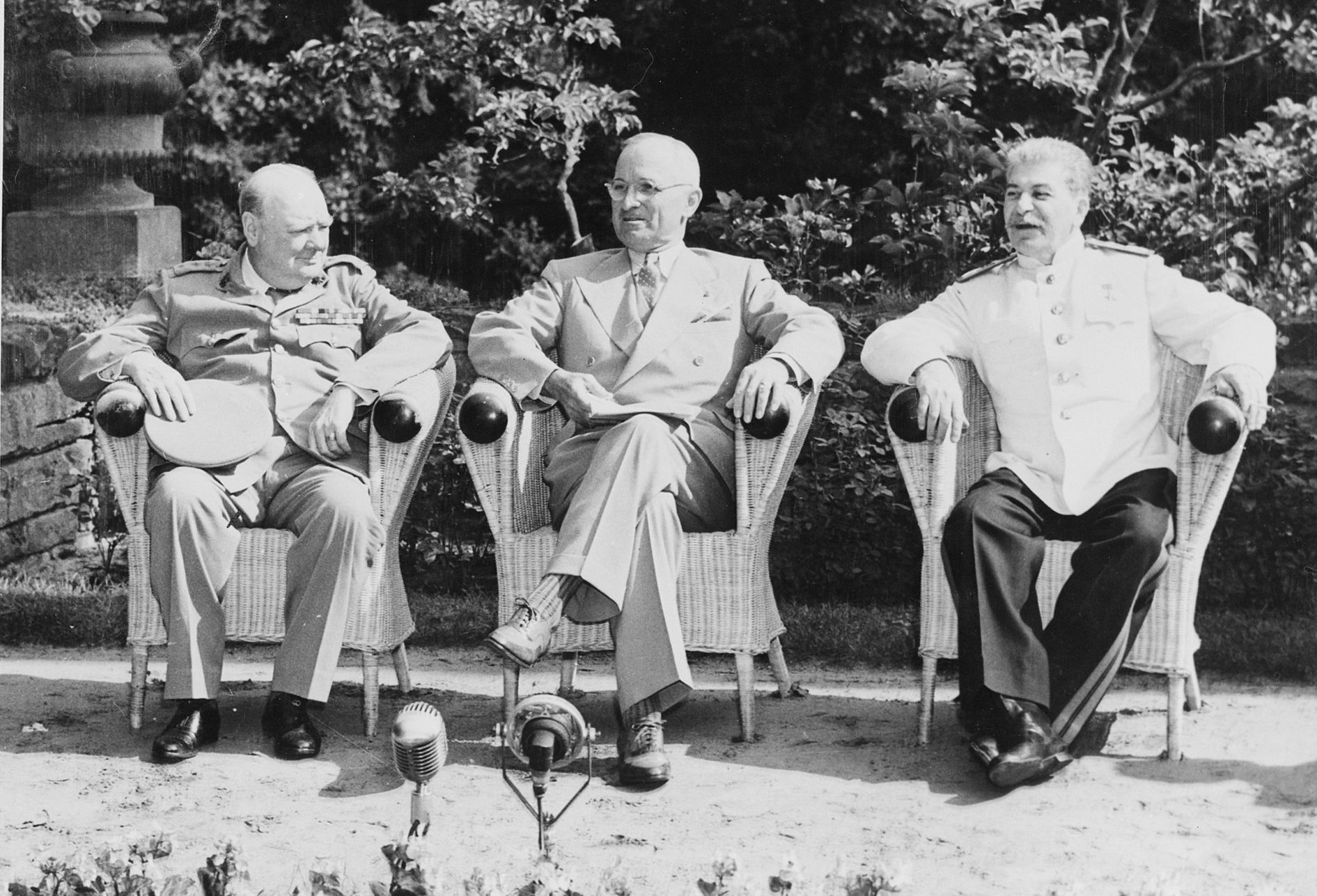
Authors: Henry Stimson
Historic Era: Era 8: The Great Depression and World War II (1929-1945)
Historic Theme:
Subject:
August 2023 | Volume 68, Issue 5

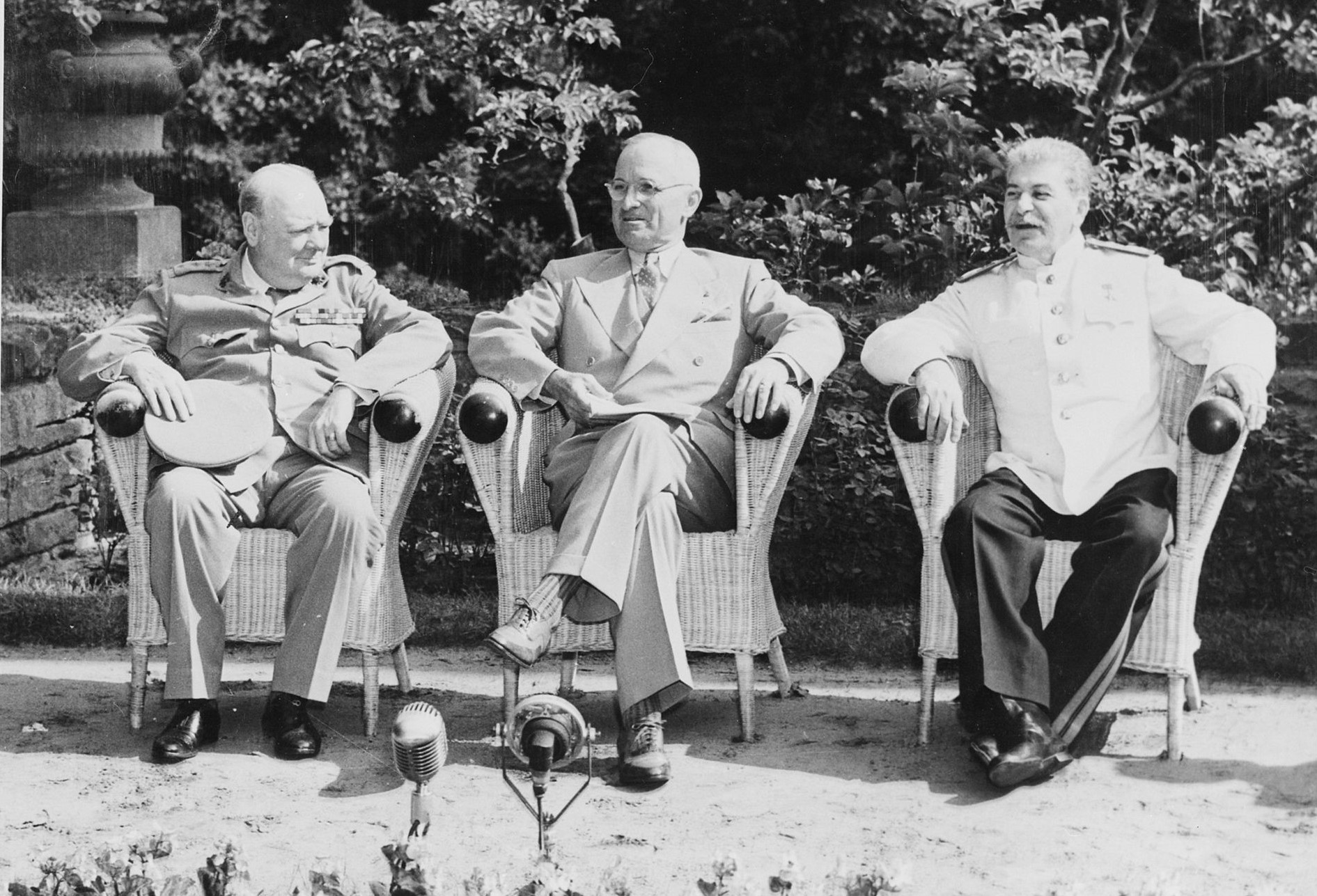
Editor's Note: In February 1947, this essay, attributed to Secretary of War Henry Stimson, was published in Harper's as a defense of the decision to use the bomb. We reprint this with the permission of Harper's.
In recent months, there has been much comment about the decision to use atomic bombs in attacks on the Japanese cities of Hiroshima and Nagasaki. This decision was one of the gravest made by our government in recent years, and it is entirely proper that it should be widely discussed. I have therefore decided to record for all who may be interested my understanding of the events which led up to the attack on Hiroshima on August 6, 1945, on Nagasaki on August 9, and the Japanese decision to surrender, on August 10. No single individual can hope to know exactly what took place in the minds of all of those who had a share in these events, but what follows is an exact description of our thoughts and actions as I find them in the records and in my clear recollection.
It was in the fall of 1941 that the question of atomic energy was first brought directly to my attention. At that time, President Roosevelt appointed a committee consisting of Vice President Wallace, General Marshall, Dr. Vannevar Bush, Dr. James B. Conant, and myself. The function of this committee was to advise the president on questions of policy relating to the study of nuclear fission, which was then proceeding both in this country and in Great Britain. For nearly four years thereafter, I was directly connected with all major decisions of policy on the development and use of atomic energy, and from May 1, 1943, until my resignation as Secretary of War on September 21, 1945, I was directly responsible to the president for the administration of the entire undertaking; my chief advisers in this period were General Marshall, Dr. Bush, Dr. Conant, and Major General Leslie R. Groves, the officer in charge of the project. At the same time, I was the president’s senior adviser on the military employment of atomic energy.
The policy adopted and steadily pursued by President Roosevelt and his advisers was a simple one. It was to spare no effort in securing the earliest possible successful development of an atomic weapon. The reasons for this policy were equally simple. The original experimental achievement of atomic fission had occurred in Germany in 1938, and it was known that the Germans had
At no time, from 1941 to 1945, did I ever hear it suggested by the president, or by any other responsible member of the government that atomic energy should not be used in war. All of us of course understood the terrible responsibility involved in our attempt to unlock the doors to such a devastating new weapon. President Roosevelt particularly spoke to me many times of his own awareness of the catastrophic potentialities of our work. But we were at war, and the work must be done.
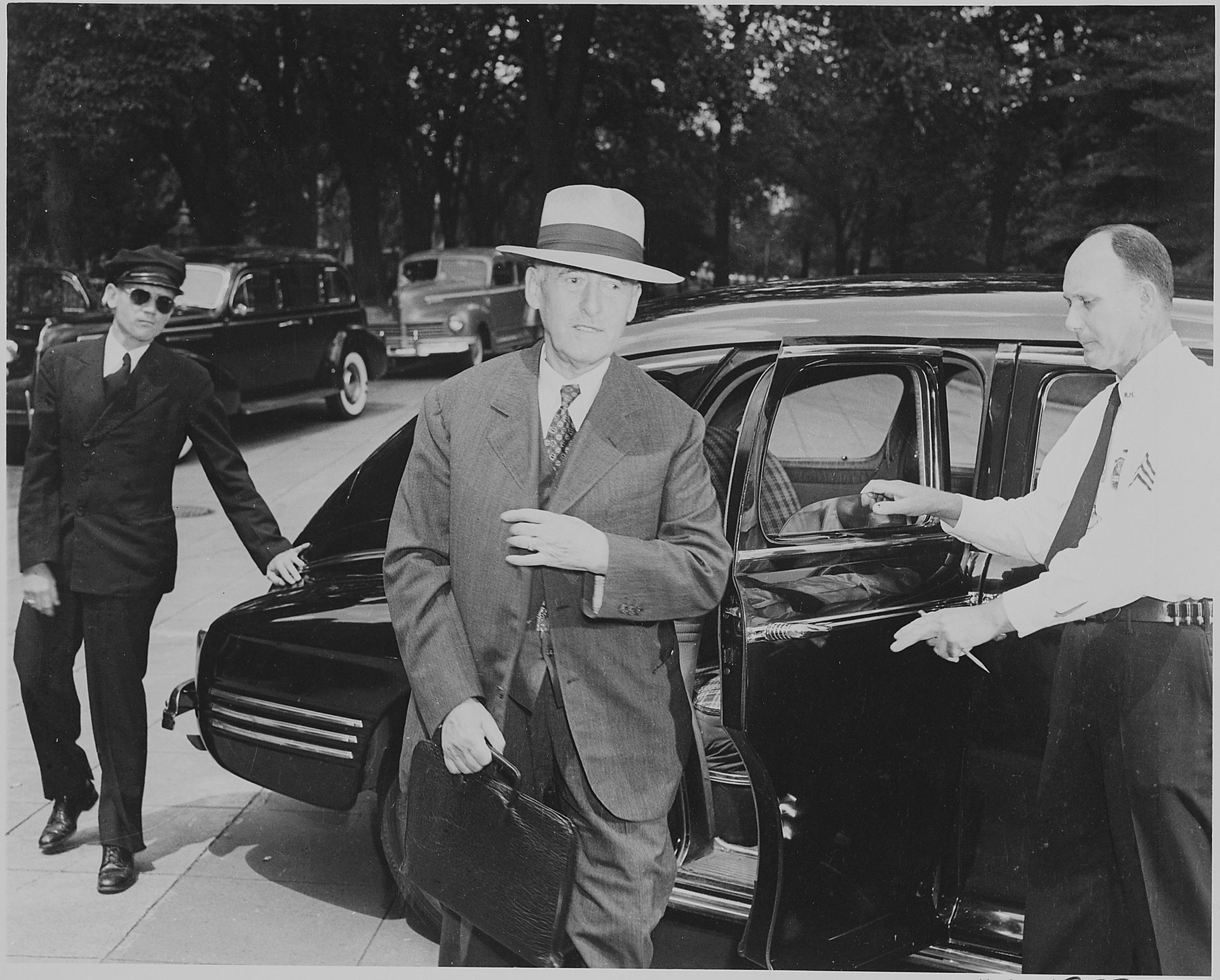
I therefore emphasize that it was our common objective, throughout the war, to be the first to produce an atomic weapon and use it. The possible atomic weapon was considered to be a new and tremendously powerful explosive, as legitimate as any other of the deadly explosive weapons of modern war. The entire purpose was the production of a military weapon; on no other ground could the wartime expenditure of so much time and money have been justified. The exact circumstances in which that weapon might be used were unknown to any of us until the middle of 1945, and when that time came, as we shall presently see, the military use of atomic energy was connected with larger questions of national policy.
The extraordinary story of the successful development of the atomic bomb has been well told elsewhere. As time went on, it became clear that the weapon would not be available in time for use in the European theater, and the war against Germany was successfully ended by the use of what are now called conventional means. But, in the spring of 1945, it became evident that the climax of our prolonged atomic effort was at hand. By the nature of atomic chain reactions, it was impossible to state with certainty that we had succeeded until a bomb had actually exploded in a full-scale experiment; nevertheless, it was considered exceedingly probable that we should, by midsummer, have successfully detonated the first atomic bomb. This was to be done at the Alamogordo Reservation in New Mexico. It was thus time for detailed consideration of our future plans. What had begun as a well-founded hope was now developing into a reality.
On March 15, 1945, I had my last talk with President Roosevelt. My diary
"The President . . . had suggested that I come over to lunch today . . . . First, I took up with him a memorandum which he sent to me from _____, who had been alarmed at the rumors of extravagance in the Manhattan project. ______ suggested that it might become disastrous, and that we get a body of 'outside' scientists to pass upon the project because rumors are going around that Vannevar Bush and Jim Conant have sold the President a lemon on the subject and ought to be checked up on."
It was rather a jittery and nervous memorandum and rather silly, and I was prepared for it, and I gave the president a list of the scientists who were actually engaged on it to show the very high standing of them, and (the group) comprised four Nobel Prize men, and, also, how practically every physicist of standing was engaged with us in the project. Then, I outlined to him the future of it and when it was likely to come off, and told him how important it was to get ready.
I went over with him the two schools of thought that exist in respect to the future control after the war of this project, in case it is successful - one of them being the secret close-in attempted control of the project by those who control it now, and the other being the international control based upon the freedom both of science and of access. I told him that those things must be settled before the first projectile is used and that he must be ready with a statement to come out to the people on it just as soon as that is done. He agreed to that . . . .
This conversation covered the three aspects of the question which were then uppermost in our minds. First, it was always necessary to suppress a lingering doubt that any such titanic undertaking could be successful. Second, we must consider the implications of success in terms of its long-range postwar effect. Third, we must face the problem that would be presented at the time of our first use of the weapon, for, with that first use, there must be some public statement.
I did not see Franklin Roosevelt again. The next time I went to the White House to discuss atomic energy was April 25, and I went to explain the nature of the problem to a man whose only previous knowledge of our activities was that of a senator who had loyally accepted our assurance
I discussed with him the whole history of the project. We had with us General Groves, who explained in detail the progress which had been made and the probable future course of the work. I also discussed with President Truman the broader aspects of the subject, and the memorandum which I used in this discussion is again a fair sample of the state of our thinking at the time.
1. Within four months, we shall, in all probability, have completed the most terrible weapon ever known in human history, one bomb of which could destroy a whole city.
2. Although we have shared its development with the U.K., physically, the U.S. is at present in the position of controlling the resources with which to construct and use it, and no other nation could reach this position for some years.
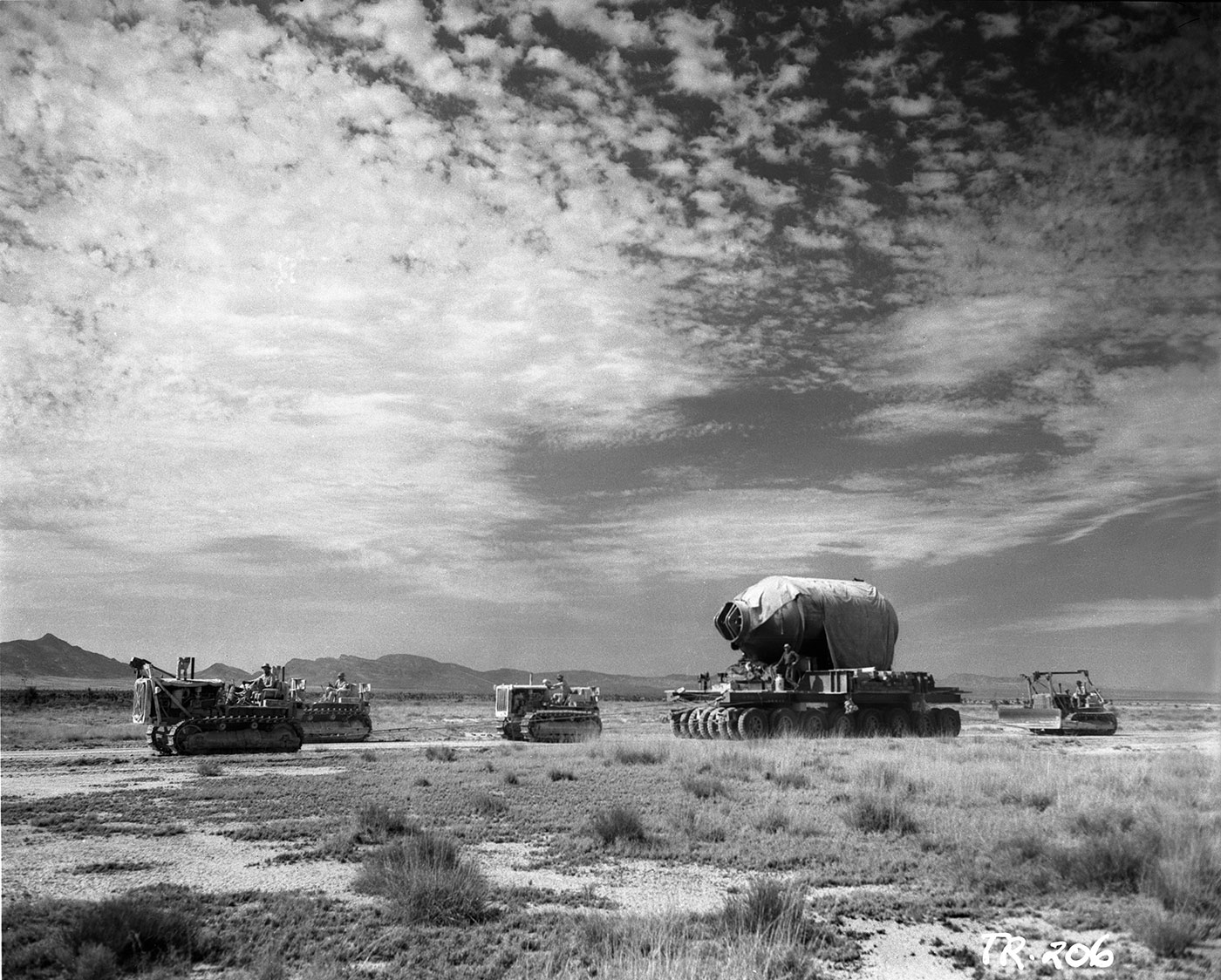
3. Nevertheless, it is practically certain that we could not remain in this position indefinitely. Various segments of its discovery and production are widely known among many scientists in many countries, although few scientists are now acquainted with the whole process which we have developed.
b. Although its construction under present methods requires great scientific and industrial effort and raw materials, which are temporarily mainly within the possession and knowledge of U.S. and U.K., it is extremely probable that much easier and cheaper methods of production will be discovered by scientists in the future, together with the use of the materials of much wider distribution. As a result, it is extremely probable that the future will make it possible for atomic bombs to be constructed by smaller nations or even groups, or at least by a larger nation in a much shorter time.
4. As a result, it is indicated that the future may see a time when such a weapon may be constructed in secret and used suddenly and effectively with devastating power by a willful nation or group against an unsuspecting nation or group of much greater size and material power. With its aid, even a very powerful, unsuspecting nation might be conquered within a very few days by a very much smaller one . . .
5.
6. To approach any world-peace organization regarding any pattern now likely to be considered, without an appreciation by the leaders of our country of the power of this new weapon, would seem to be unrealistic. No system of control heretofore considered would be adequate to control this menace. Both inside any particular country and between the nations of the world, the control of this weapon will undoubtedly be a matter of the greatest difficulty and would involve such thoroughgoing rights of inspection and internal controls as we have never theretofore contemplated.
7. Furthermore, in the light of our present position with reference to this weapon, the question of sharing it with other nations and, if so shared, upon what terms, becomes a primary question of our foreign relations. Also, our leadership in the war and in the development of this weapon has placed a certain moral responsibility upon us which we cannot shirk, without very serious responsibility for any disaster to civilization which it would further.
8. On the other hand, if the problem of the proper use of this weapon can be solved, we would have the opportunity to bring the world into a pattern in which the peace of the world and our civilization can be saved.
9. As stated in General Groves’ report, steps are underway looking towards the establishment of a select committee of particular qualifications for recommending action to the executive and legislative branches of our government when secrecy is no longer in full effect. The committee would also recommend the actions to be taken by the War Department prior to that time, in anticipation of the postwar problems. All recommendations would of course be first submitted to the president.
The next step in our preparations was the appointment of the committee referred to in paragraph (9) above. This committee, which was known as the Interim Committee, was charged with the function of advising the president on the various questions raised by our apparently imminent success in developing an atomic weapon. I was its chairman, but the principal labor of guiding its extended deliberations fell to George L. Harrison, who acted as chairman in my absence. It will be useful to consider the work of the committee in some detail. Its members were the following, in addition to Mr. Harrison and myself:
The discussions of the committee ranged over the whole field of atomic energy, in its political, military, and scientific aspects. That part of its work which particularly concerns us here relates to its recommendations for the use of atomic energy against Japan, but it should be borne in mind that these recommendations were not made in a vacuum. The committee’s work included the drafting of the statements which were published immediately after first bombs were dropped, the drafting of a bill for the domestic control of atomic energy, and recommendations looking toward the international control of atomic energy.
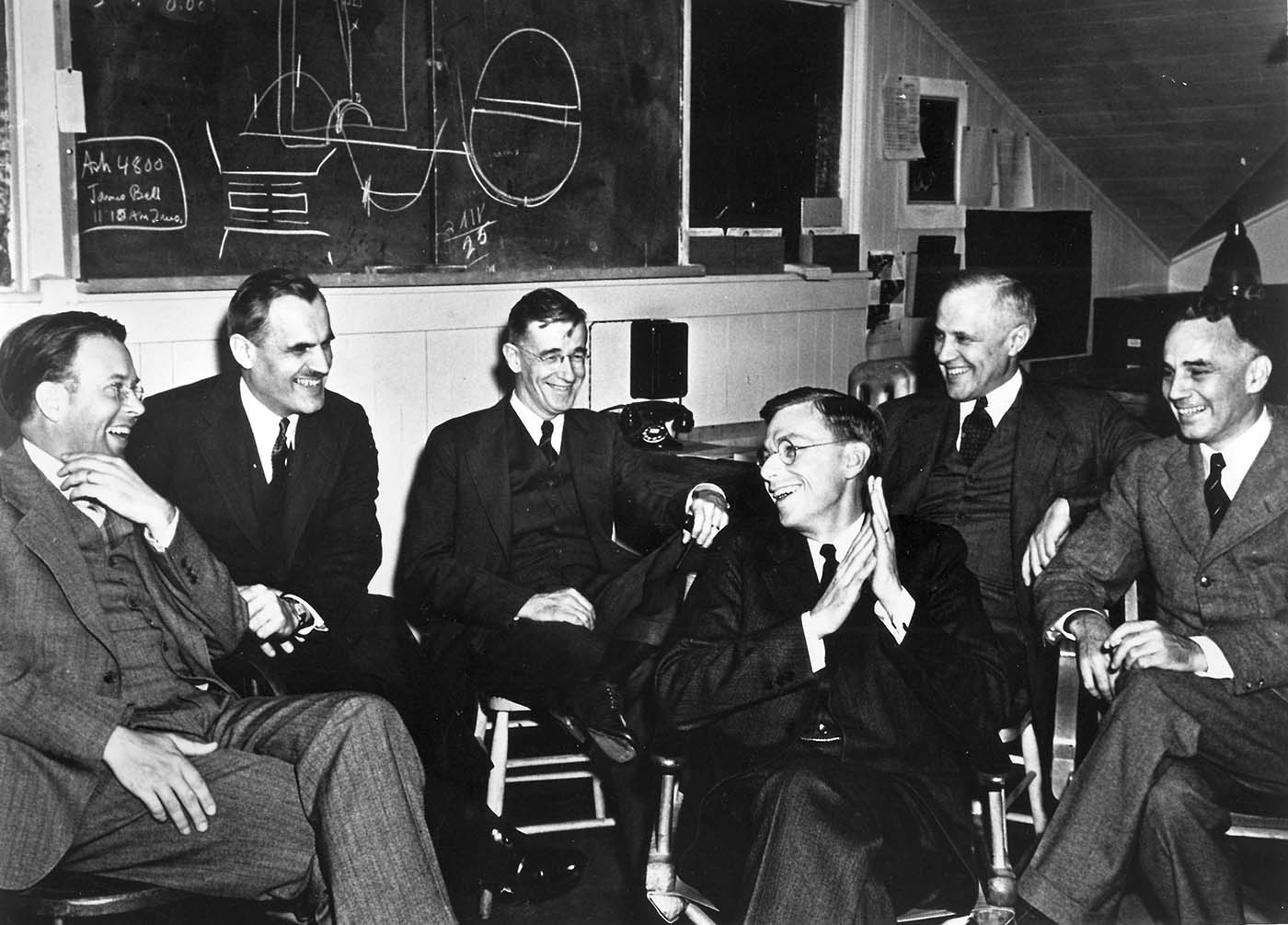
The Interim Committee was assisted in its work by a scientific panel whose members were the following: Dr. A. H. Compton, Dr. Enrico Fermi, Dr. E. O. Lawrence, and Dr. J. R. Oppenheimer. All four were physicists of the first rank; all four had held positions of great importance in the atomic project from its inception. At a meeting with the Interim Committee and the scientific panel on May 31, 1945, I urged all those present to feel free to express themselves on any phase of the subject, scientific or political. Both General Marshall and I expressed the view that atomic energy could not be considered simply in terms of military weapons, but must also be considered in terms of a new relationship of man to the universe.
On June 1, after its discussions with the scientific panel, the Interim Committee unanimously adopted the following recommendations:
(1) The bomb should be used against Japan as soon as possible.
(2) It should be used on a dual-target plant surrounded by or adjacent to houses and other buildings most susceptible to damage, and
(3) It should be used without prior warning (of the nature of the weapon). One member of the committee, Mr. Bard, later changed his view and dissented from this recommendation.
In reaching these conclusions, the Interim Committee carefully considered such alternatives as a detailed advance warning or a demonstration in some uninhabited area. Both of these suggestions were discarded as impractical. They were not regarded as likely to be effective in compelling a surrender of Japan, and both of them involved serious risks.
Even the New Mexico test would not give final proof that any given bomb was certain to explode when dropped from an airplane. Quite apart from the generally unfamiliar nature of atomic explosives, there was the whole problem of exploding a bomb at a predetermined height in the air by a complicated mechanism which could not be tested in the static test of New Mexico. Nothing would have been more damaging to our effort to obtain surrender than a warning
The Interim Committee and the scientific panel also served as a channel through which suggestions from other scientists working on the project were forwarded to me and to the president. Among the suggestions thus forwarded was one memorandum which questioned using the bomb at all against the enemy. On June 16, 1945, after consideration of that memorandum, the scientific panel made a report, from which I quote the following paragraphs:
"The opinions of our scientific colleagues on the initial use of these weapons are not unanimous: they range from the proposal of a purely technical demonstration to that of the military application best designated to induce surrender. Those who advocate a purely technical demonstration would wish to outlaw the use of atomic weapons, and have feared that, if we use the weapons now, our position in future negotiations will be prejudiced. Others emphasize the opportunity of saving American lives by immediate military use, and believe that such use will improve the international prospects, in that they are more concerned with the prevention of war than with the elimination of this special weapon. We find ourselves closer to these latter views; we can propose no technical demonstration likely to bring an end to the war; we see no acceptable alternative to direct military use.
With regard to these general aspects of the use of atomic energy, it is clear that we, as scientific men, have no proprietary rights. It is true that we are among the few citizens who have had occasion to give thoughtful consideration to these problems during the past few years. We have, however, no claim to special competence in solving the political, social, and military problems which are presented by the advent of atomic power."
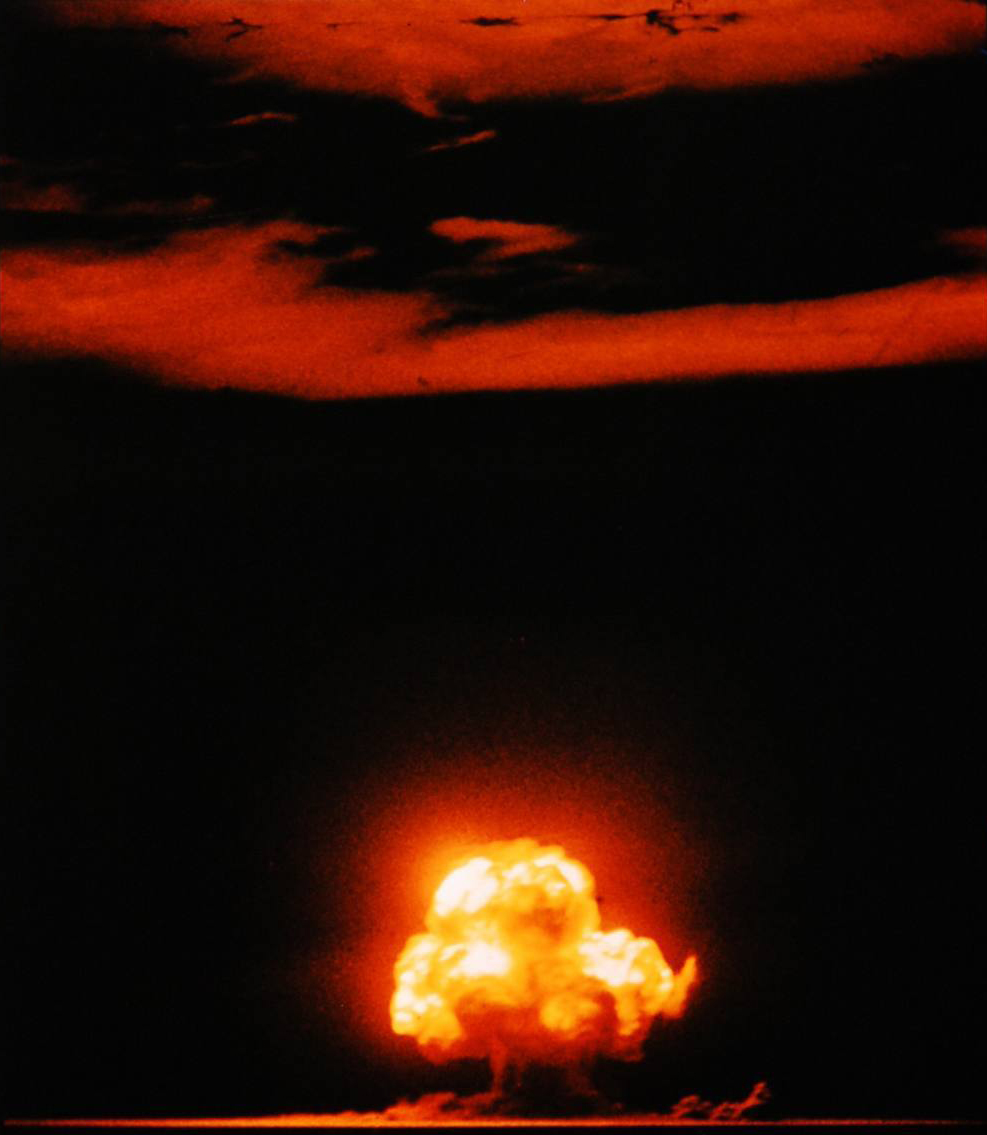
The foregoing discussion presents the reasoning of the Interim Committee and its advisers. I have discussed the work of these gentlemen at length in order to make it clear that we sought the best advice that we could find. The committee’s function was, of course, entirely advisory. The conclusions of the committee were similar to my own, although I reached mine independently. I felt that, to extract a genuine surrender from the emperor and his military advisers, they must be administered a tremendous shock which would carry convincing proof of our power to destroy the empire. Such an effective shock would save many times the number of lives, both American and Japanese, that it would cost.
The facts upon which my reasoning was based and steps taken to carry it out now follow.
U.S. Policy toward Japan in July 1945
The principal political, social, and military objective of the United States in the summer of 1945 was the prompt
Japan, in July 1945, had been seriously weakened by our increasingly violent attacks. It was known to us that she had gone so far as to make tentative proposals to the Soviet government, hoping to use the Russians as mediators in a negotiated peace. These vague proposals contemplated the retention by Japan of important conquered areas and were therefore not considered seriously. There was as yet no indication of any weakening in the Japanese determination to fight, rather than accept unconditional surrender. If she should persist in her fight to the end, she had still a great military force.
In the middle of July 1945, the intelligence section of the War Department General Staff estimated Japanese military strength as follows: in the home islands, slightly under 2,000,000; in Korea, Manchuria, China proper, and Formosa, slightly over 2,000,000; in French Indochina, Thailand, and Burma, over 200,000; in the East Indies area, including the Philippines, over 500,000; in the bypassed Pacific islands, over 100,000. The total strength of the Japanese Army was estimated at about 5,000,000 men. These estimates later proved to be in very close agreement with official Japanese figures.
The Japanese army was in much better condition than its navy and air force. The navy had practically ceased to exist, except as a harrying force against an invasion fleet. Its air force has been reduced mainly to reliance upon kamikaze, or suicide, attacks. These latter, however, had already inflicted serious damage on our seagoing forces, and their possible effectiveness in a last-ditch fight was a matter of real concern to our naval leaders.
As we understood it in July, there was a very strong possibility that the Japanese government might decide on resistance to the end, in all the areas of the Far East under its control. In such an event, the Allies would be faced with the enormous task of destroying an armed force of five million men and five thousand suicide aircraft, belonging to a race which had already amply demonstrated its ability to fight literally to the death.
The strategic plans of our armed forces for the defeat of Japan, as they stood in July, had been prepared without reliance upon the atomic bomb, which had not yet been tested in New Mexico. We were planning an intensified sea and air blockade, and greatly intensified strategic air bombing, through the summer and early fall, to be followed on November 1 by an invasion of the southern island of Kyushu. This would be followed in turn by an invasion of the main island of Honshu in the spring of 1946. The total U.S. military and naval force involved in this grand design was of the order of 5,000,000 men; if all those indirectly concerned are included, it was
We estimated that, if we should be forced to carry this plan to its conclusion, the major fighting would not end until the latter part of 1946, at the earliest. I was informed that such operations might be expected to cost over a million casualties, to American forces alone. Additional large losses might be expected among our allies, and, of course, if our campaign were successful, and if we could judge by previous experience, enemy casualties would be much larger than our own.
It was already clear in July that, even before the invasion, we should be able to inflict enormously severe damage on the Japanese homeland by the combined application of “conventional” sea and air power. The critical question was whether this kind of action would induce surrender. It therefore became necessary to consider very carefully the probable state of mind of the enemy, and to asses the line of conduct which might end his will to resist.
With these considerations in mind, I wrote a memorandum for the president on July 2 which I believe fairly represents the thinking of the American government as it finally took shape in action. This memorandum was prepared after discussion and general agreement with Joseph C. Grew, Acting Secretary of State, and Secretary of the Navy James Forrestal, and when I discussed it with the president, he expressed his general approval.
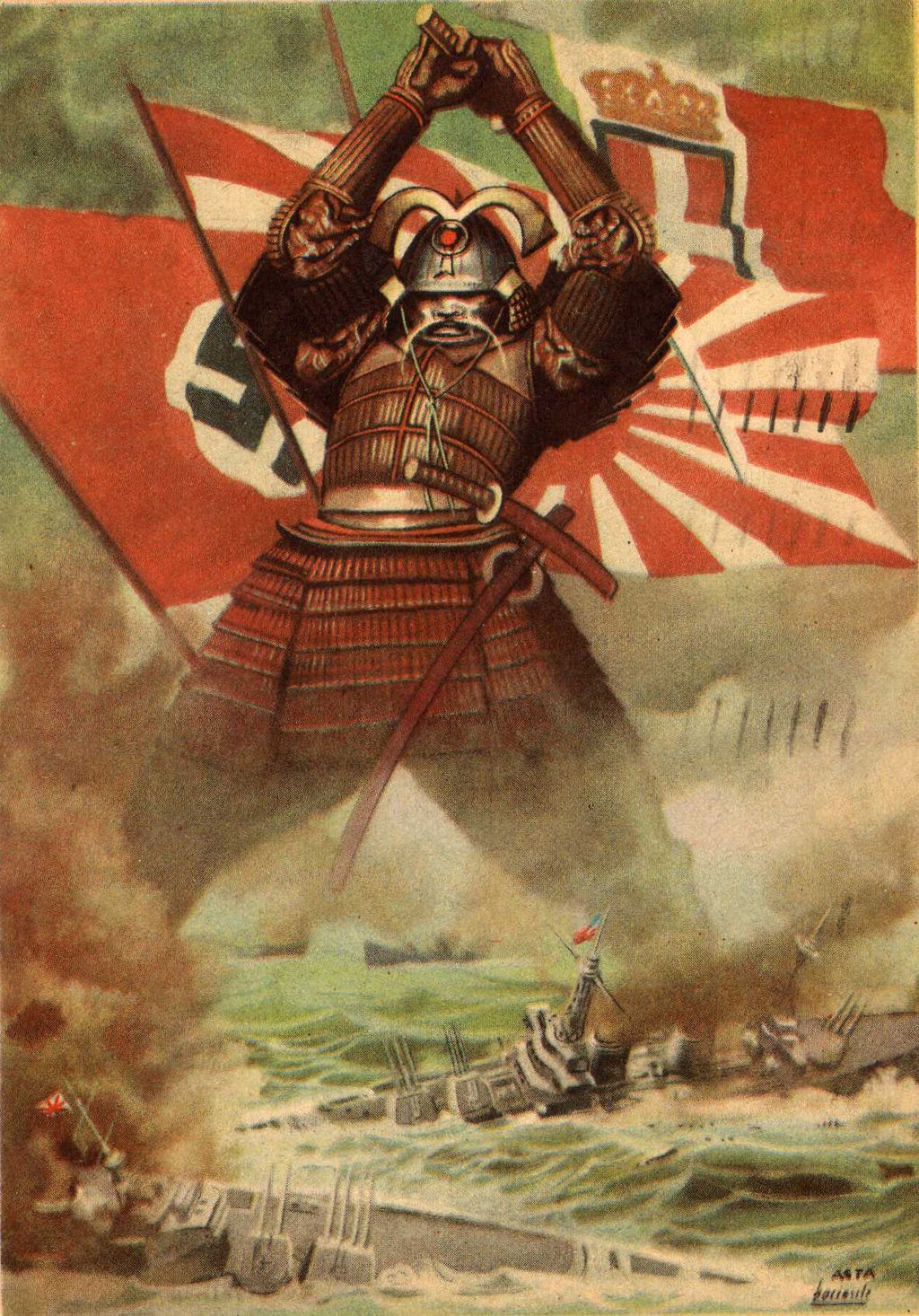
July 2, 1945
Memorandum for the President
PROPOSED PROGRAM FOR JAPAN
1. The plans of operation up to and including the first landing have been authorized, and the preparations for the operation are now actually going on. This situation was accepted by all members of your conference on Monday, June 18.
2. There is reason to believe that the operation for the occupation of Japan following the landing may be a very long, costly, and arduous struggle on our part. The terrain, much of which I have visited several times, has left the impression on my memory of being one which would be susceptible to a last-ditch defense such as has been made on Iwo Jima and Okinawa and which of course is very much larger than either of those two areas. According to my recollection, it will be much more unfavorable with regard to tank maneuvering than in either the Philippines or Germany.
3. If we once land on one of the main islands and begin a forceful occupation of Japan, we shall probably have cast the die of last-ditch resistance. The Japanese are highly patriotic and certainly susceptible to calls for fanatical resistance to repel an invasion. Once started in actual invasion, we shall, in my opinion, have to go through with an even more bitter fight to the finish than in Germany. We shall incur the losses incident to such a war and we shall have to leave the Japanese islands even more thoroughly destroyed
4. A question then comes: Is there any alternative to such a forceful occupation of Japan which will secure for us the equivalent of an unconditional surrender of her forces and a permanent destruction of her power again to strike an aggressive blow at the “peace of the Pacific”? I am inclined to think that there is enough such chance to make it well worthwhile our giving them a warning of what is to come and a definite opportunity to capitulate. As above suggested, it should be tried before the actual forceful occupation of the homeland islands is begun, and furthermore, the warning should be given in ample time to permit a national reaction to set in.
We have the following enormously favorable factors on our side––factors much weightier than those we had against Germany:
Japan has no allies.
Her navy is nearly destroyed and she is vulnerable to a surface and underwater blockade which can deprive her of sufficient food and supplies for her population.
She is terribly vulnerable to our concentrated attack on her crowded cities, industrial and food resources.
She has against her not only the Anglo-American forces, but the rising forces of China and the ominous threat of Russia.
We have inexhaustible and untouched industrial resources to bring to bear against her diminishing potential.
We have great moral superiority through being a victim of her first sneak attack.
The problem is to translate these advantages into prompt and economical achievement of our objectives. I believe Japan is susceptible to reason in such a crisis to a much greater extent than is indicated by our current press and other current comment. Japan is not a nation composed wholly of mad fanatics of an entirely different mentality from ours. On the contrary, she has, within the past century, shown herself to possess extremely intelligent people, capable in an unprecedented short time of adopting not only the complicated technique of Occidental civilization but to a substantial extent its culture and political and social ideas.
Her advance in all these respects during the short period of sixty or seventy years has been one of the most astounding feats of national progress in history––a leap from the isolated feudalism of centuries into the position of one of the six or seven great powers of the world. She has not only built up powerful armies and navies. She has maintained an honest and effective national finance and respected position in many of the sciences in which we pride ourselves. Prior to the forcible seizure of power over her government by the fanatical military group in 1931, she had, for ten years, lived a reasonable,
My own opinion is in her favor on two points involved in this question:
a. I think the Japanese nation has the mental intelligence and versatile capacity in such a crisis to recognize the folly of a fight to the finish and to accept the proffer of what will amount to an unconditional surrender; and
b. I think she has, within her, enough liberal leaders (although now submerged by the terrorists) to be depended upon for her reconstruction as a responsible member of the family of nations. I think she is better in this last respect than Germany was. Her liberals yielded only at the point of the pistol and, so far as I am aware, their liberal attitude has not been personally subverted in the way which was so general in Germany.
On the other hand, I think that the attempt to exterminate her armies and her population by gunfire or other means will tend to produce a fusion of race solidity and antipathy which has no analogy in the case of Germany. We have a national interest in creating, if possible, a condition wherein the Japanese nation may live as a peaceful and useful member of the future Pacific community.
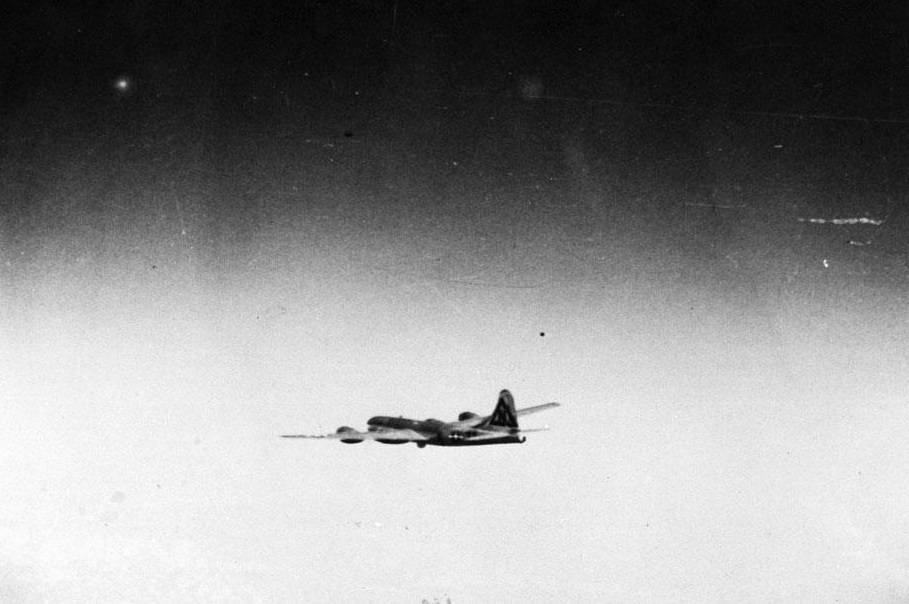
5. It is therefore my conclusion that a carefully timed warning be given to Japan by the chief representatives of the United States, Great Britain, China, and if then a belligerent, Russia, by calling upon Japan to surrender and permit the occupation of her country in order to insure its complete demilitarization for the sake of the future peace.
This warning should contain the following elements:
*the varied and overwhelming character of the force we are about to bring to bear on the islands
*the inevitability and completeness of the destruction which the full application of this force will entail
*the determination of the Allies to destroy permanently all authority and influence of those who have deceived and misled the country into embarking on world conquest
*the determination of the Allies to limit Japanese sovereignty to her main islands and to render them powerless to mount and support another war
*the disavowal of any attempt to extirpate the Japanese as a race or to destroy them as a nation
*a statement of our readiness, once her economy is purged of its militaristic influence, to permit the Japanese to maintain such industries, particularly of a light consumer character, as offer no threat of aggression against their neighbors, but which can produce a sustaining economy, and provide a reasonable standard of living.
The statement should indicate our willingness, for this purpose, to give Japan trade access to external raw materials, but no longer any control over the sources of supply outside her main islands. It should also indicate our willingness, in accordance with our now-established foreign trade
*the withdrawal from their country as soon as the above objectives of the Allies are accomplished, and as soon as there has been established a peacefully inclined government, of a character representative of the masses of the Japanese people.
I personally think that if, in saying this, we should add that we do not exclude a constitutional monarchy under her present dynasty, it would substantially add to the chances of acceptance.
Success of course will depend on the potency of the warning which we give her. She has an extremely sensitive national pride and, as we are now seeing every day, when actually locked with the enemy, will fight to the very death. For that reason, the warning must be tendered before the actual invasion has occurred and while the impending destruction, though clear beyond peradventure, has not yet reduced her to fanatical despair. If Russia is a part of the threat, the Russian attack, if actual, must not have progressed too far. Our own bombing should be confined to military objectives as far as possible.
It is important to emphasize the double character of the suggested warning. It was designed to promise destruction if Japan resisted, and hope, if she surrendered.
It will be noted that the atomic bomb is not mentioned in this memorandum. On grounds of secrecy, the bomb was never mentioned, except when absolutely necessary, and furthermore, it had not yet been tested. It was of course well forward in our minds, as the memorandum was written and discussed, that the bomb would be the best possible sanction if our warning were rejected.
The Use of the Bomb
The adoption of the policy outlined in the memorandum of July 2 was a decision of high politics; once it was accepted by the president, the position of the atomic bomb in our planning became quite clear. I find that I stated in my diary, as early as June 19, that “the last-chance warning . . . must be given before an actual landing of the ground forces in Japan, and fortunately, the plans provide for enough time to bring in the sanctions to our warning in the shape of heavy ordinary bombing attacks and an attack of S-1." (S-1 was a code name for the atomic bomb.)
There was much discussion in Washington about the timing of the warning to Japan. The controlling factor in the end was the date already set for the Potsdam meeting of the Big Three. It was President Truman’s decision that such a warning should be solemnly issued by the U.S. and the U.K. from this meeting, with the concurrence of the head of the Chinese government, so that it would be plain that all of Japan’s principal enemies were in entire unity. This was done, in the
On July 28, the Prime Minister Suzuki rejected the Potsdam ultimatum by announcing that it was “unworthy of public notice.” In the face of this rejection, we could only proceed to demonstrate that the ultimatum had meant exactly what it said when it stated that, if the Japanese continued the war, “the full application of our military power, backed by our resolve, will mean the inevitable and complete destruction of these Japanese armed forces and, just as inevitably, the utter devastation of the Japanese homeland.”
For such a purpose, the atomic bomb was an eminently suitable weapon. The New Mexico test occurred while we were at Potsdam, on July 16. It was immediately clear that the power of the bomb measured up to our highest estimates. We had developed a weapon of such a revolutionary character that its use against the enemy might well be expected to produce exactly the kind of shock on the Japanese ruling oligarchy which we desired, strengthening the position of those who wished peace, and weakening that of the military party.
Because of the importance of the atomic mission against Japan, the detailed plans were brought to me by the military staff for approval. With President Truman’s warm support, I struck off the list of suggested targets the city of Kyoto. Although it was a target of considerable military importance, it had been the ancient capital of Japan and was a shrine of Japanese art and culture. We determined that it should be spared. I approved four other targets, including the cities of Hiroshima and Nagasaki.
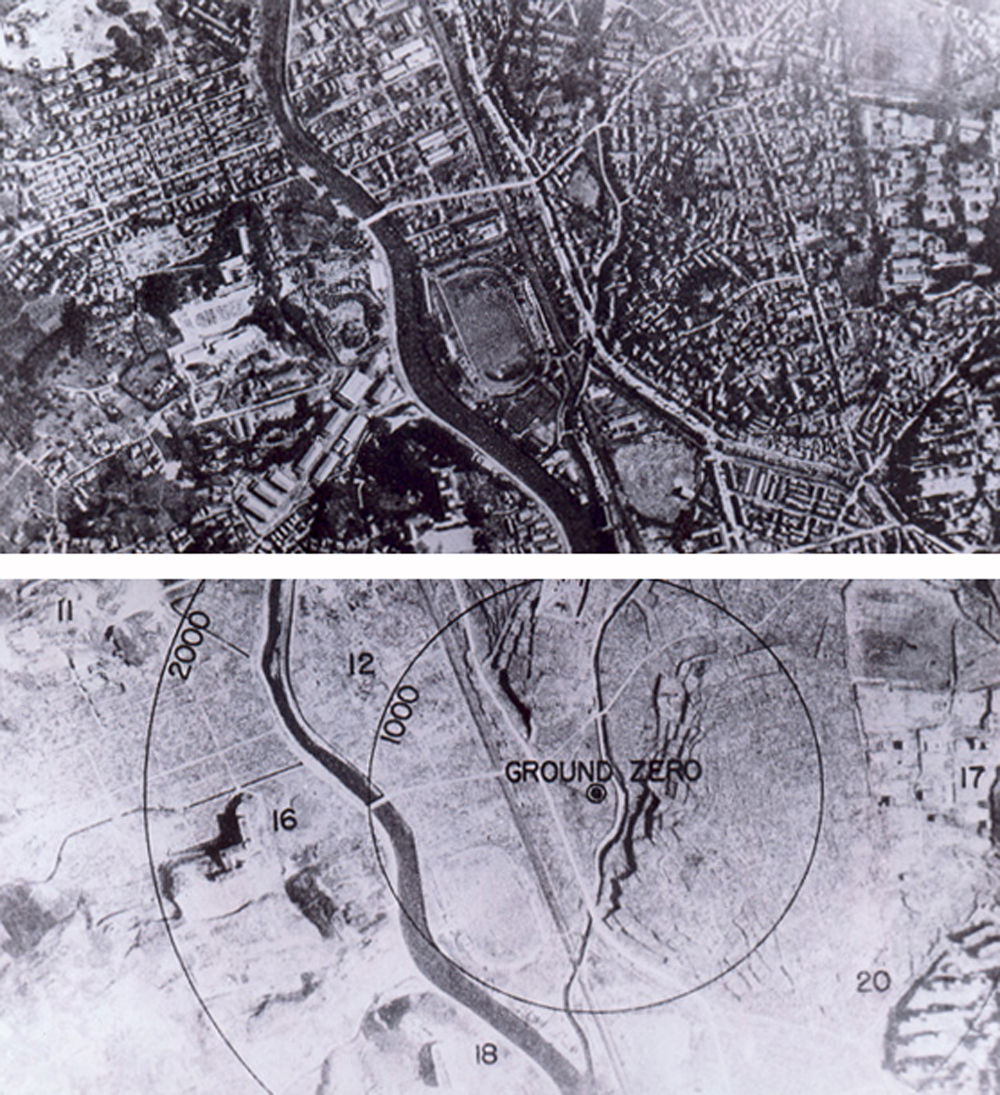
Hiroshima was bombed on August 6, and Nagasaki on August 9. These two cities were active working parts of the Japanese war effort. One was an army center; the other was naval and industrial. Hiroshima was the headquarters of the Japanese Army defending southern Japan and was a major military storage and assembly point. Nagasaki was a major seaport and it contained several large industrial plants of great wartime importance. We believed that our attacks had struck cities which must certainly be important to the Japanese military leaders, both Army and Navy, and we waited for a result. We waited one day.
Many accounts have been written about the Japanese surrender. After a prolonged Japanese cabinet session in which the deadlock was broken by the emperor himself, the offer to surrender was made on August 10. It was based on the Potsdam terms, with a reservation concerning the sovereignty of the emperor. While the Allied reply made no promises, other than those already given, it implicitly recognized the emperor’s position by prescribing that his power must be subject to the orders of the Allied Supreme Commander. These terms were accepted on August 14 by the Japanese, and
The two atomic bombs which we had dropped were the only ones we had ready, and our rate of production at the time was very small. Had the war continued until the projected invasion on November 1, additional fire raids of B-29’s would have been more destructive of life and property than the very limited number of atomic raids which we could have executed in the same period.
But the atomic bomb was more than a weapon of terrible destruction; it was a psychological weapon. In March 1945, our Air Force had launched its first great incendiary raid on the Tokyo area. In this raid, more damage was done and more casualties were inflicted than was the case at Hiroshima. Hundreds of bombers took part and hundreds of tons of incendiaries were dropped.
Similar successive raids burned out a great part of the urban area of Japan, but the Japanese fought on. On August 6, one B-29 dropped a single atomic bomb on Hiroshima. Three days later, a second bomb was dropped on Nagasaki, and the war was over. So far as the Japanese could know, our ability to execute atomic attacks, if necessary, by many planes at a time, was unlimited. As Dr. Karl Compton has said, “it was not one atomic bomb, or two, which brought surrender; it was the experience of what an atomic bomb will actually do to a community, plus the dread of many more, that was effective.”
The bomb thus served exactly the purpose we intended. The peace party was able to take the path of surrender, and the whole weight of the emperor’s prestige was exerted in favor of peace. When the emperor ordered surrender, and the small but dangerous group of fanatics who opposed him were brought under control, the Japanese became so subdued that the great undertaking of occupation and disarmament was completed with unprecedented ease.
A Personal Summary
In the foregoing pages, I have tried to give an accurate account of my own personal observations of the circumstances which led up to the use of the atomic bomb and the reasons which underlay our use of it. To me, they have always seemed compelling and clear, and I cannot see how any person vested with such responsibilities as mine could have taken any other course or given any other advice to his chiefs.
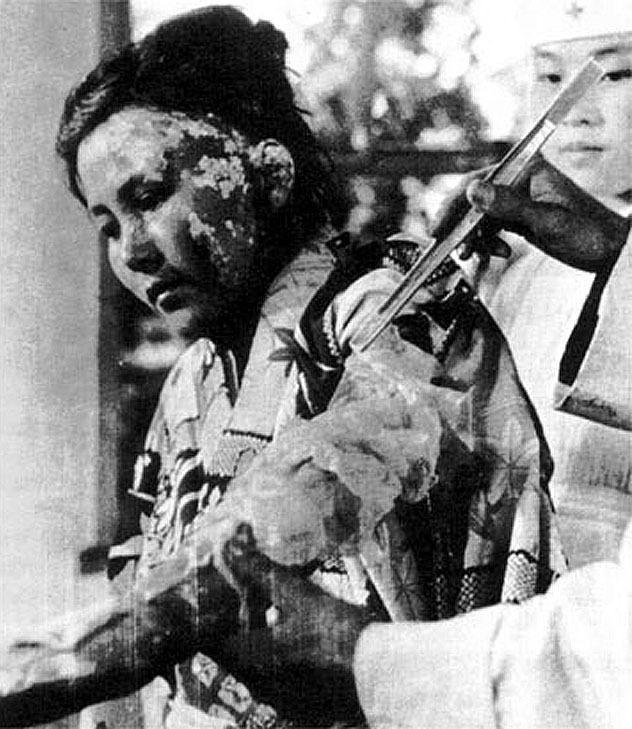
Two great nations were approaching contact in a fight to a finish
In the light of the formidable problem which thus confronted us, I felt that every possible step should be taken to compel a surrender of the homeland, and withdrawal of Japanese troops from the Asiatic mainland and from other positions, before we had commenced an invasion. We held two cards to assist us in such an effort. One was the traditional veneration in which the Japanese emperor was held by his subjects and the power which was thus vested in him over his loyal troops. It was for this reason that I suggested in my memorandum of July 2 that his dynasty should be continued. The second card was the use of the atomic bomb in the manner best calculated to persuade that emperor and the counselors about him to submit to our demand for what was essentially unconditional surrender, placing his immense power over his people and his troops subject to our orders.
In order to end the war in the shortest possible time and to avoid the enormous losses of human life which otherwise confronted us, I felt that we must use the emperor as our instrument to command and compel his people to cease fighting and subject themselves to our authority through him, and that, to accomplish this, we must give him and his controlling advisers a compelling reason to accede to our demands. This reason furthermore must be of such a nature that his people could understand his decision. The bomb seemed to me to furnish a unique instrument for that purpose.
My chief purpose was to end the war in victory with the least possible cost in the lives of the men in the armies which I had helped to raise. In the light of the alternatives which, on a fair estimate, were open to us, I believe that no man in our position and subject to our responsibilities, holding in his hands a weapon of such possibilities for accomplishing this purpose and saving those lives, could have failed to use it and afterwards looked his countrymen in the face.
As I read over what I have written, I am aware that much of it, in this year of peace, may have a harsh and unfeeling sound. It would perhaps be possible to say the same things and say them more gently. But I do not think it would be wise.
As I look back over the five years of my service as Secretary of War, I see too many stern and heartrending decisions to be willing to pretend that war is anything else than what it is. The face of war is the face of death; death is an inevitable part of every order that a wartime leader gives. The decision to use the atomic bomb was a decision that brought death to over a hundred thousand Japanese.
No explanation can change that fact, and I do not wish to gloss over it. But this deliberate, premeditated destruction was our least abhorrent choice. The destruction of Hiroshima and Nagasaki put an end to the Japanese war. It stopped the fire raids and the strangling blockade; it ended the ghastly specter of a clash of great land armies.
In this last great action of the Second World War, we were given final proof that war is death. War in the twentieth century has grown steadily more barbarous, more destructive, more debased in all its aspects. Now, with the release of atomic energy, man’s ability to destroy himself is nearly complete.
The bombs dropped on Hiroshima and Nagasaki ended a war. They also made it wholly clear that we must never have another war. This is the lesson man and leaders everywhere must learn, and I believe that, when they learn it, they will find a way to lasting peace. There is no other choice.
In view of the exceptional public importance of this article, permission is given to any newspaper or magazine to reprint it, in part or (preferably, since its effect is cumulative) in full, with credit to Harper’s Magazine, but without charge. ––The Editors
